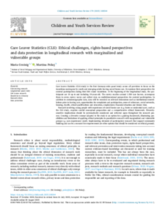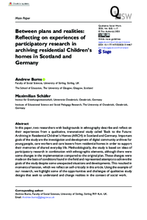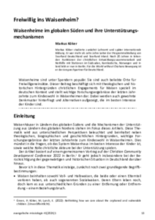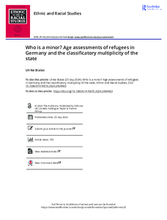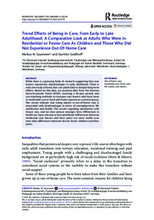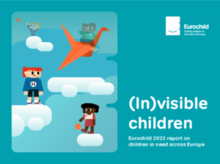Displaying 1 - 10 of 81
This article presents the Care Leaver Statistics (CLS) study, the first nationwide panel study in Germany focused on young people leaving out-of-home care, like foster or residential care. It follows about 1,500 youth aged 16–19 over several years to understand their life transitions, including education, employment, housing, health, social networks, and societal participation. The study also emphasizes ethical research practices, diversity sensitivity, and participatory methods that can empower care-experienced youth.
In this paper, two researchers with backgrounds in ethnography describe and reflect on their experiences from a qualitative, transnational study called 'Back to the Future: Archiving in Residential Children's Homes (ARCH) in Scotland and Germany. Important goals of the study are the investigation and development of digital community archives for young people, care workers and care leavers from residential homes in order to support their memories of shared everyday life.
Dieser Beitrag beschäftigt sich mit theologischen und historischen Hintergründen christlichen Engagements für Waisen speziell im deutschen Kontext und stellt wichtige Forschungsergebnisse der letzten Jahrzehnte zum Kindeswohl in Waisenheimen dar. Dabei werden auch gewohnten Denkmuster hinterfragt und Alternativen aufgezeigt, die im besten Interesse der Kinder sind.
This study examined the categories that states use to classify and govern migrants. Unaccompanied minors and adult asylum seekers are treated very differently regarding their asylum cases and residence permits. The study focused on Germany, where the courts and youth welfare offices commission age assessments to decide whether young migrants will be considered minors or adults. These assessments are carried out by forensic medical examiners and social workers, respectively, who work with very different understandings of what constitutes age.
This article addresses two issues: whether the inequalities faced by cared for children will persist in different stages of their lives and whether these inequalities are dependent on the specific out-of-home care setting, i.e. residential or foster care. The authors examine data from the German Socio-Economic Panel (SOEP), covering a 50-year period.
This longitudinal study aims at investigating the attachment disorder symptoms during the first year of placement in foster care. The participants
were recruited through German social services departments around Dortmund, the Ruhr valley, and the Metropolitan region of Nuremberg.
This report highlights the recommendations and priorities that EU decision-makers and national governments can do to support the most vulnerable children and prevent widening inequalities.
This volume covers a broad spectrum of current research findings concerning the participation of young people in foster families and residential living groups in Australia, Canada, Germany, Ireland, Italy, Portugal, Norway, Sweden, and Switzerland as well as cross-nationals perspective on children and young people’s participation in foster and residential care placements in Great Britain and France.
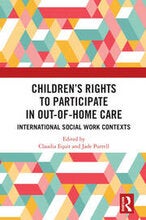
The UN Child Rights Committee (CRC) today issued its findings on Germany, Kuwait, North Macedonia, the Philippines, South Sudan, Ukraine, Uzbekistan and Viet Nam after reviewing the eight States parties during its latest session.
In this workshop Family for Every Child members Flüchtlingsrat Niedersachsen (The Refugee Council of Lower Saxony, Germany), Programma Integra (Italy) and METAdrasi (Greece) share their experience around supporting unaccompanied minors, with For Our Children (FoC) in Bulgaria. They share top tips with FoC as they navigate the arrival of unaccompanied minors fleeing the conflict in Ukraine, and find ways to support them.

